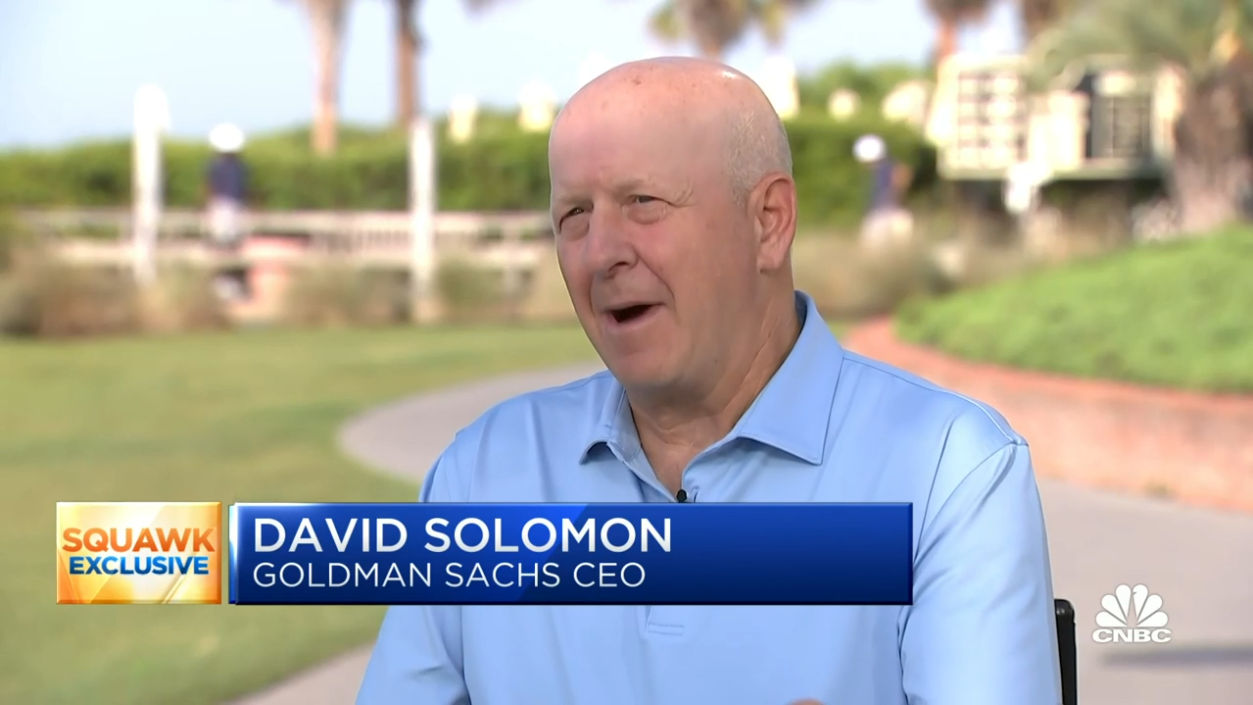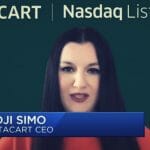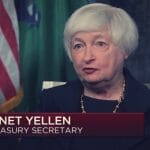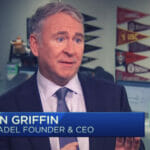Following is the unofficial transcript of a CNBC interview with Goldman Sachs (NYSE:GS) Chairman & CEO David Solomon on CNBC’s “Squawk Box” (M-F, 6AM-9AM ET) today, Tuesday, February 28th.
Goldman Sachs CEO: The Real Opportunity For Us Is Around Asset And Wealth Management
ANDREW ROSS SORKIN: Okay Joe, we’ve got a big interview. Goldman Sachs kicking off its second ever Investor Day this morning and joining us right here at the bank’s headquarters in downtown Manhattan, first right here on CNBC is Goldman Sachs’s Chairman and CEO, David Solomon. David, thank you for joining us.
Q4 2022 hedge fund letters, conferences and more
DAVID SOLOMON: Thanks, Andrew. It's, it's great to have you here in the building. I think this is the second time we've had you here in the building in the last year.
SORKIN: Help us understand what you're going to be talking about today. There's been a lot of noise dare I say I think almost every other day there is now a new headline about Goldman Sachs, about you, about what the firm is, what it isn't. Some some of the criticism fair, probably some unfair. What do you think the investor community and maybe the public misunderstands about Goldman?
SOLOMON: Well, first of all, I'm excited to have you here today and I'm excited to have our Investor Day today. This is only as you highlighted Andrew the second time in over 150 years we've brought investors into the building to give them an update on our business and our progress.
And I think you know, back three years ago when we had our first Investor Day, we laid out a good strategic plan for the firm. We laid out a plan to invest in our core businesses. We pointed to four areas that we thought were interesting opportunities for the firm to grow asset management, wealth management, transaction banking, and also consumer banking.
We said we'd run the firm more efficiently, and we put out some targets and metrics to track our performance over time. And today, we're updating investors on our progress and candidly, we've made we've made a lot of progress over the last three years, and I'm excited to have a number of my colleagues Dan Dees who's one of three people runs a big global banking and, banking and markets franchise.
We'll talk about the progress we've made in that business, the strength of that business, the market share gains in that business, talk about the asset management platform, and we'll also update people on our journey around the consumer business, which has obviously gotten a lot of attention.
But I feel good about our progress and spent a lot of time with investors over the last few months. And I know where investors are excited to be here and get a little bit more information as they track our journey.
SORKIN: When people think about Goldman and they think about the valuation of Goldman in the banking space, I think there's still a lot of questions broadly about what it is that a firm like Goldman needs to do to transform itself consumer was one of those pieces that people thought might transform the valuation and the story in a different way that hasn't happened. How do you shift around that?
SOLOMON: Well, when we laid out a plan three years ago, we talked about a number of avenues for growth and opportunity and I think it's absolutely fair that our execution around the consumer platforms hasn't been to the standard we'd like it be.
There's still opportunity for us. We have some interesting platforms where we've built good technology and have good partners, and we're working to improve the performance of those platforms. But the real story of opportunity for growth for us in the coming years is around asset management and wealth management.
And if you look at the work we've done over the last few years to put that platform together, we're running the fifth largest active asset manager in the world. We set a management fee target a few years ago when we had about five and a half billion dollars in management fees for $10 billion dollars in management fees in 2024.
We finished last year at 8.8 billion. We're clearly on track to meet that target. We continue to meet our fundraising targets. We started with a fundraising target and alternatives of $150 billion. We blew past that ahead of schedule we’re at 180 billion headed to 225 million to fundraising.
So there's real opportunity across the firm for us continue to make the firm more durable and I'd also point to Andrew and this is one of the reasons why I think our stock on a relative basis has performed reasonably well over the last few years is that we've we've grown the earnings of the firm materially so our EPS in 2022 was 40% more than our EPS was before our last Investor Day. So we’re. we’re making progress but we’ve got more work to do.
SORKIN: In terms, if we were to look at a pie chart five years from now in terms of the asset management piece of the business which is the piece that the market at least today would value at a higher, at a higher multiple than the banking and trading piece, it would look like what?
SOLOMON: I think it would look it would look larger because that's going to continue to grow. There are a couple of aspects of that business. Obviously we're adding assets and we're partnering with more institutions, etc.
We're moving to an asset light model. We had always used our balance sheet very extensively and part of the strategy has been to significantly reduce our balance sheet and we're about halfway through that journey. But it will be a bigger piece of the business.
I think that you'll see private banking revenue, which has grown meaningfully over the last few years continue to grow. And we've also set the firm up so there's an ability to see and track more clearly our progress in those businesses.
Now I don't want to take away, Goldman Sachs is the leader in investment banking and markets. Global banking and markets is a premier franchise. We have extraordinary people that work hard every day to serve our clients and their relative performance in that business has been fantastic. And so that's always going to be a big part of Goldman Sachs.
We're going to continue to grow the businesses that we think are important to serve our clients. We've got an interesting ethos around One Goldman Sachs and I think it's I think it's working.
SORKIN: Let me read you a critique though.
SOLOMON: Sure.
SORKIN: Did you read the Financial Times this morning?
SOLOMON: I did not read the Financial Times.
SORKIN: Okay. This is the editorial board op ed I'm sorry yesterday you read this yesterday, you know what I'm about to say probably then. This is the FT, “The bank whose dominance is Goldman Sachs who was once so assured they gained notoriety as the vampire squid is now more of a damp squid.”
They write, “Solomon did not err in his judgment that Goldman needed to diversify. The question is the wisdom of the mix he chose and its bungled implementation.” I’m curious what you think of that and, and also, if there's a lesson in all of this.
SOLOMON: Well I don’t, I mean, I don't I don't like that. But at the same point, that's I would say that's that's an opinion from one source. I look to our clients, and I listen to our clients, and the feedback from our clients about the way the way we serve them continues to be excellent.
Our market shares across our core business continue to be excellent and they've actually grown and our banking and markets business we've increased our market shares by 350 basis points, our wallet share over the last few years.
Of course, we haven't executed perfectly on everything. But when I look across the spectrum of work we've done to grow the firm, to improve the way we serve our clients, to strengthen our business, we've made a lot of progress and in the places Andrew where we've fallen short, we will we will reflect. We will learn we will adapt because that's what good businesses do and that’s what we’re doing.
SORKIN: I don’t want to belabor the point, but let's just talk about that because I think there are people who say, was there a lesson learned about the consumer piece. If you go back look, the consumer piece started under Lloyd Blankfein, right? Do you look back and say that that was where the mistake was made?
Do you say to yourself, okay, I took that. And I had I there was a fork in the road. I could have said, we're stopping that we're not doing that. Or I could have doubled down which I think is what you'd argue you probably did at that moment. When you look back at that do you say to yourself okay, but there was a lesson in that and it is?
SOLOMON: I think the important thing as businesses experiment and try new things, and again, you know, in the proportion of Goldman Sachs, you know, I want to kept in perspective. You know, Goldman Sachs, you know, earned 10.2%, on its equity last year, made $11.3 billion after tax. This was something that was an emerging opportunity for us.
We did not execute well on it. There are parts of it that we executed very well on, we built a deposit platform that works very well. It's attractive. It's good for consumers. We've built a big deposit base, which is hugely strategic for us. So there are parts of the strategy that we executed well on, there are parts that we didn't.
I think the important thing that you do is you look at what you've done. You learn, you adapt, you correct, you move forward. And so I think I said this to you the last time you asked me these questions when I was on TV a month ago, I said to you know Andrew, I think we tried to do too much too quickly.
And as a result, our execution in some areas of this wasn't good. And so what do you do? You correct that. And so, you know, that's that's what businesses do. There isn't there isn't a business that that kind of goes through and doesn't have successes, but also some stumbles.
SORKIN: One related question on the consumer side which is you are staying in the credit card business. You have this partnership with Apple, you have another partnership with General Motors.
There was a story that came out yesterday on CNBC.com that suggested that the apple deal the terms of that deal, were quote, “One sided,” that when folks internally actually saw the terms of that deal said, this doesn't make sense. My question is, do those terms still make sense? And here's the deal with GM the same.
SOLOMON: You know, we we have partnerships. These are great companies. We have long dated partnerships. I think one of the things that's not well understood is we're partners. When you’re partners you both benefit and you both you both have friction from deals.
And so one of the things we work with our partners on is making the partnership stronger so that we can serve our customers better and we're very focused on that with both Apple and GM and there's lots of opportunity in that for Goldman Sachs and for Apple and for General Motors.
SORKIN: As I was looking through the deck this morning that you're going to be presenting later, ESG is on a couple of the pages in big bold letters. I want to read you though there's obviously a huge debate going on in this country.
It's almost a political debate, but this is Vanguard’s CEO just wrote this recently said, “We cannot state that ESG environmental, social and governance investing is better performance wise than broad index investing.
Our research indicates that ESG investing does not have any advantage over broad based investing.” What do you think of that as somebody who I think has advocated for the ideas around ESG?
SOLOMON: Well, I I'm, I'm a big advocate for climate transition, but it's just that it's a transition that's gonna go on over a long period of time.
I think one of the things we do as an asset manager is we meet the needs of capital allocators, and capital allocators are interested in allocating some capital, not all of their capital, some capital towards technologies towards opportunities that are driving the transition, that are making the world more sustainable, you know, for all of us. And so I think it's important for us as an asset manager to participate in that.
SORKIN: But what do you make of the political blowback and how is that impacted your thinking about all of this.
SOLOMON: The political blowback really hasn't affected my thinking that meaningfully. I've always been of the belief that it's important for us to try to be constructive and allocating risk capital and driving risk capital toward technologies that can accelerate the transition.
But it's a transition it's going to take decades. And Goldman Sachs is still going to be involved with traditional energy companies or helping traditional energy companies think about—
SORKIN: Have you had, have you had states that you've done business for say, hey, you know what, you guys have taken out, taken either positions on these things. You've been active articulating a lot of the things around ESG, we don't want to be in business with that.
I mean, you've you've seen the blowback again from the BlackRocks, the Larry Finks of the world. That's what I was curious what kind of conversation—
SOLOMON: I've seen, I’ve seen the, I've seen the noise and the blowback from other places. I think that we continue to serve our clients broadly and as a result, we've not been specifically you know, raised in one of these dialogues.
You know, I've said publicly it's transition we finance fossil fuel companies and we also, you know, finance an enormous amount of capital into exciting technologies that can accelerate the transition.
We need secure energy, we need secure energy. And I think one of the things we've learned over the course of the last 12 months is our energy supply chains, the security of those supply chains, the availability at attractive prices for end users is very, very important for us.
SORKIN: We've talked about China a lot over the years. It feels like the tensions have only gotten worse over the years that we've we've had those conversations, and I'm curious how you think the bank plans to approach the issue of China, doing business in China, working with with clients in China and around China, working with investors, thinking about investing in China? How has your thinking changed if at all?
SOLOMON: Well, I think it's hard to operate in this environment and not have your thinking shift a little bit given the fact that we're at a very, very tough place in the bilateral relationship between the U.S and China. And my own view is I think it's probably going to get tougher over the next couple of years before it before it gets better.
We operate though in service of our clients and they can be global clients that are doing business in China. They can sometimes be clients on the ground. You know, I think the lens is the lens local clients.
I think the lens has shifted a little bit given the environment but we we will serve our clients as they need to be served if somehow from from our government from a legislative process there are changes in capital flow rules, etc. We’ll obviously adapt to them. But certainly our view is it's a more cautious time in terms of our own investment in our franchise—
SORKIN: So the risk premium has gone up?
SOLOMON: The risk premium has gone up. But we've you know, we've got a reasonable footprint in Hong Kong, you know, a smaller footprint on the mainland, and it's there to serve our clients and we're going to continue to serve our clients because candidly, they need more advice at this point in time, given the complexity of this situation.
SORKIN: You talk a lot about technology in the deck and what this firm can be almost as a technology, I don't know if you think of yourself as a FinTech player at all. We talk a lot about ChatGPT on the show. I'm curious where you think AI really plays out on this and have you been playing with ChatGPT even itself in the context of finance?
SOLOMON: I have been playing with it, you know, personally just to understand it, but, you know, we're certainly spending time thinking about it. I think that that that the AI technologies have the potential to be very, very transformative. You know, the potential to be very, very transformative in the same way that the internet was very, very transformative.
SORKIN: How far out though are we in terms of what it could do—
SOLOMON: I don't, I'm not, you know, I'm not a technologist that can really tell you how far out are we. My guess is, is that the acceleration of the technologies and the impact they can have on work processes, workflows, and some of the things that we do and a whole range of businesses in some ways will come quicker than people believe.
And in other ways, the real disruption will be longer dated. But we're spending time thinking about it. There are very simple things around workflow and processes that you certainly can lever but it's exciting technology.
And I think it's something that you know, all businesses as I move around, and talk to our clients, our clients are thinking about how does this affect my business? How can it affect the way I have certain processes that inform—
SORKIN: How does it affect to fix labor and I ask because the technology space has just gone through a big round of layoffs. You went through some layoffs of your own. Do you think long term this changes that dynamic?
SOLOMON: I would step, you know, way, way up at a very high-level Andrew and just say if you and I were sitting interviewing each other 150 years ago, we'd be talking about how industrialization was gonna affect labor.
You know, the world changes, technology changes. We adapt as a society, we find new ways, new skill sets where people can thrive and there's opportunity. You know, I'm a bull on the long-term case for that regardless of the technologies that come.
I'm not going to sit here and say this technology is going to meaningfully impact you know, labor and opportunity. I don't that's not the way I look at the world.
SORKIN: I wanted to ask you about buybacks. Again, another issue that you raise in the deck today. 2.25 billion so far?
SOLOMON: We filed our 10-K last Thursday and it highlighted that as of last Thursday, we bought back two and a quarter billion dollars in the quarter.
SORKIN: You probably saw Warren Buffett over the weekend said that folks are economic illiterates if they're against the world of buybacks, you've authorized up to $30 billion. When you think to yourself, if I could spend $2.25 billion on my stock, you have to believe that your stock is therefore undervalued, versus using that money in some other way. How do you think through that?
SOLOMON: Well, we have we have a capital allocation policy that's very, very clear. And when we discuss it with our board and we're actively engaged with a board on capital allocation, we talk first and foremost of the opportunities in our business to deploy capital to serve our clients and grow our business.
And that is our first order, you know, of business where are the opportunities to serve our clients. The second order of business that is if you know once once we've met those demands, etc., we generate a lot of capital as a business, the capital belongs to shareholders, we return it so we have a dynamic capital management process.
If you look at our buyback activity last year, you saw that it ranged from $500 million in some quarters to this past quarter, it was two and a quarter billion.
SORKIN: If you could buy anything in the world, what would you buy?
SOLOMON: If I could buy anything?
SORKIN: Yeah.
SOLOMON: You know, I don't know. Maybe I'd like a new car.
SORKIN: For the firm.
SOLOMON: I, you know, look, Andrew I as as we look ahead at the moment, we're focused on the execution of our businesses. At the moment we've laid out in the investor deck I know you've seen it, we've laid out very clearly that in our global banking and markets business, we are focused on continuing to grow our market shares and increase our financing activity for our clients.
In asset wealth management, we're driving management fees, we have a big management fee target, we're on track to meet it, and we're gonna continue to grow our management fees, and we're focused on bringing platform solutions to profitability. That's where our focus is.
SORKIN: Final question and it's what all your clients are probably asking you, which is where is this economy headed? There's, there's the Goldman analyst’s view, but what is the David Solomon family view?
SOLOMON: Well, I like to say that I sit around with my daughters talking about the macro economy, but they have other things that they'd rather talk about when we're together so I don't I don't know what the family view is. But I would what I would say as I'm talking to CEOs Andrew, there has been a shift over the last six months.
I think there was a lot of pessimism around the chance that we could get through this cycle without a real recession. Given how quickly we were changing economic conditions, we've now been at a period of nine months where we've had a real tightening of economic conditions.
You know, obviously, the impact of that will lag. We've taken inflation from double digits down, you know, more to five, six. I think the general consensus is inflation is going to be stickier when I talk to see a stickier and harder to move, you know, from where it is now down to 3% let's say let alone two percent, and in the context of that, you know, higher rates, longer, sluggish growth, stickier, but a better chance that we can muddle through with a softer landing.
And so I think there's a little more optimism because people's businesses have been performing better. The consumer has been more resilient. Service businesses in particular have been doing very well. So I think we're in a place where there's a little bit more optimism about muddling through, but I think inflation is going to be sticky and hard and, you know, I think anyone running a business has to be prepared for kind of a bumpy 12 to 18 to 24 months.
SORKIN: David Solomon, thank you very much.
SOLOMON: Absolutely. Thank you. Thank you. Thanks for being here.













